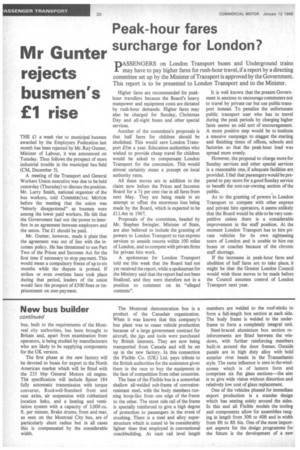Peak-hour fares surcharge for London?
Page 32

If you've noticed an error in this article please click here to report it so we can fix it.
PASSENGERS on London Transport buses and Underground trains may have to pay higher fares for rush-hour travel, if a report by a directing committee set up by the Minister of Transport is approved by the Government. This report is to be presented to London Transport and to the Minister.
Higher fares are recommended for peakhour travellers because the Board's heavy manpower and equipment costs are dictated by rush-hour demands. Higher fares may also be charged for Sunday, Christmas Day and all-night buses and other special services.
Another of the committee's proposals is that half fares for children should be abolished. This would save London Transport £5m a year. Education authorities who wished to provide cheap travel for children would be asked to compensate London Transport for the concession. This would almost certainly mean a precept on local authority rates.
All these moves are in addition to the claim now before the Prices and Incomes Board for a 71 per cent rise in all fares from next May. They are being made in an attempt to offset the enormous loss being made by the Board, which is expected to be £11.4m in 1967.
Proposals of the committee, headed by Mr. Stephen Swingler, Minister of State, are also believed to include the granting of powers to London Transport to run express services to seaside resorts within 100 miles of London, and to compete with private firms for private hire work.
A spokesman for London Transport told me this week that the Board had not yet received the report, while a spokesman for the Ministry said that the report had not been finalized, and they were therefore not in a position to comment on its "alleged contents". It is well known that the present Government is anxious to encourage commuters not to travel by private car but use public transport instead. To penalize the unfortunate public transport user who has to travel during the peak periods by charging higher fares seems an odd sort of encouragement. A more positive step would be to institute a massive campaign to stagger the starting and finishing times of offices, schools and factories so that the peak-hour load was spread more evenly.
However, the proposal to charge more for Sunday services and other special services is a reasonable one, if adequate facilities are provided. I feel that passengers would be prepared to pay more for a good Sunday service to benefit the non-car-owning section of the public.
As to the granting of powers to London Transport to compete with other express and private hire operators, it seems unlikely that the Board would be able to be very competitive unless there is a considerable improvement in the staff position. At the moment London Transport has to hire private vehicles for its own sightseeing tours of London and is unable to hire out buses or coaches because of the chronic staff shortage.
If the increases in peak-hour fares and abolition of half fares are to take place, it might be that the Greater London Council would wish these moves to be made before the Council assumes control of London Transport next year.
















































































































